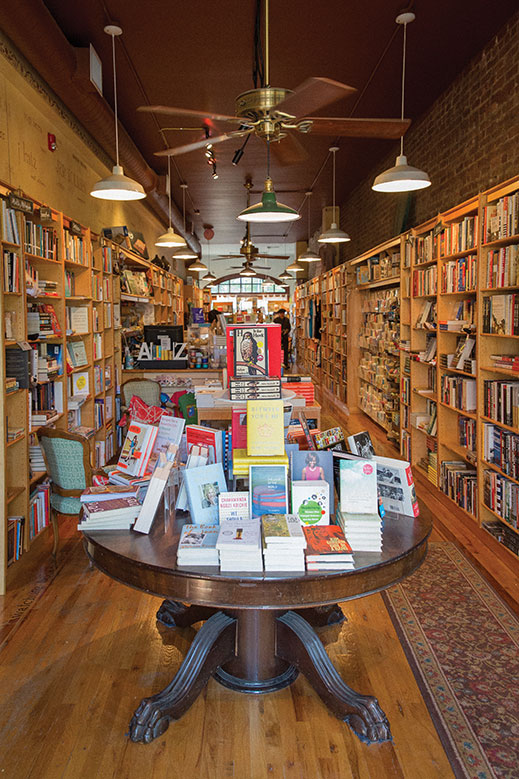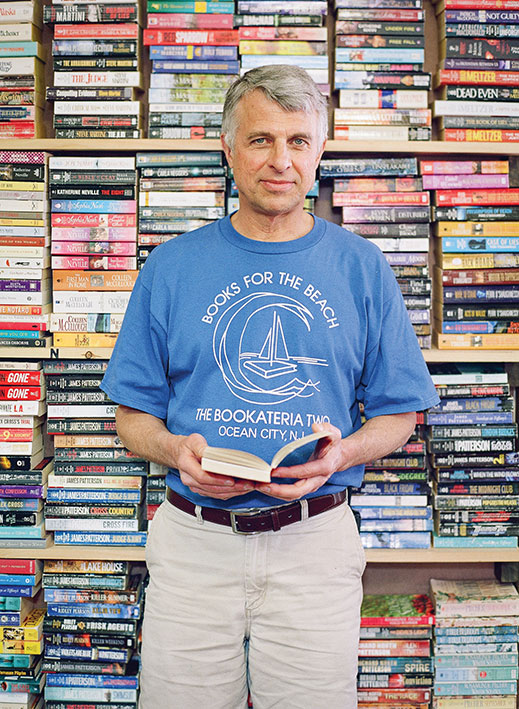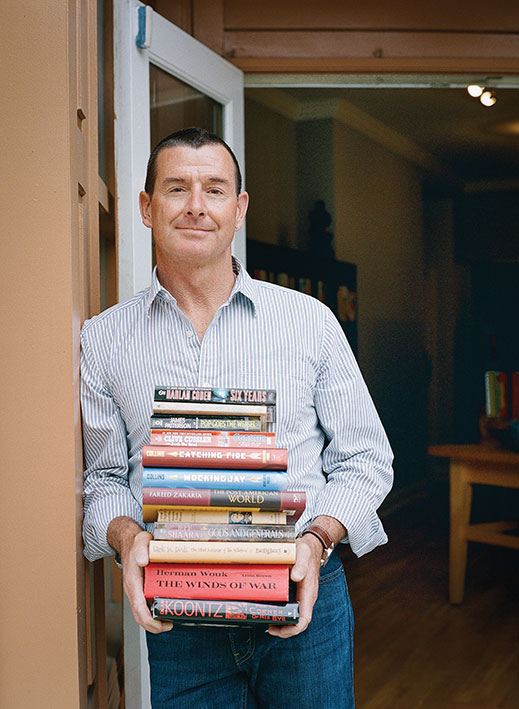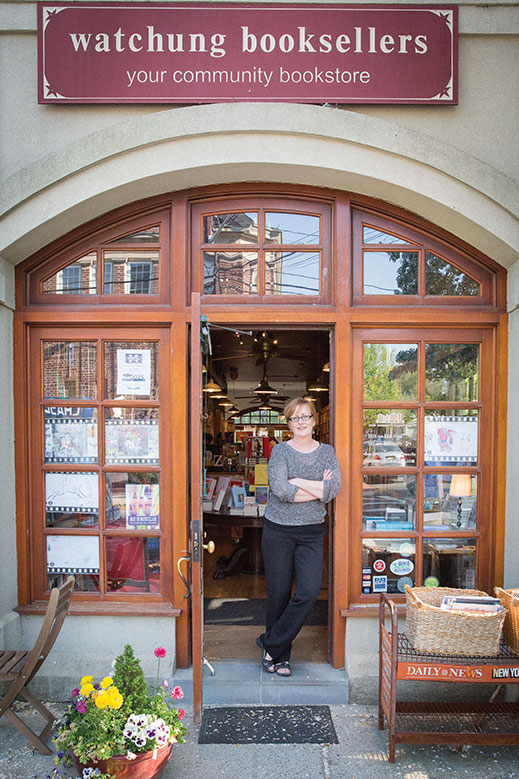
Watchung Booksellers in Montclair creates an inviting space for browsers and attracts large crowds for in-store readings. Photo by Frank Marshall
Before she opened Little City Books in Hoboken in May, Kate Jacobs considered adopting a formula that one of her two cofounders, Donna Garban, had come up with.
“She said, ‘If everybody in Hoboken buys one book a year, we’ll be fine,’” says Jacobs, a musician who has watched more than a few book shops come and go since moving to the Mile Square City in 1981.
“I thought, That’s a nice, clear goal.”
Then she did the math. Considering that Hoboken’s population is almost 53,000, Little City would have to sell an average of 145 books per day, 365 days a year, to hit Garban’s target. Seen in that light—and considering the well-publicized plight of other booksellers over the past decade—the goal becomes somewhat quixotic.
The dwindling of independent bookstores is old news. What’s new is the optimism, however guarded, of booksellers like Jacobs and her Little City partners.
“What’s been amazing is, as soon as word got out that we were opening the store, so many people came out of the woodwork to say how interested they were in what we’re doing,” Jacobs says. “There’s a huge community of editors, writers and publishers in town, and they all wanted a book-store as much as we did.” Since the local Barnes & Noble closed in 2010, Hoboken has made do with a single used bookstore, Symposia.
The Internet has battered book retailing, particularly the advent of Amazon, which began selling books online in 1995. New York-based Barnes & Noble is the last of the big bookstore chains, with 649 retail stores remaining, including 24 in New Jersey. Its former closest competitor, Borders, which once had more than 1,200 stores, is defunct.

Wood Robinson, owner of Ocean City’s Bookateria Two, stocks plenty of beach reading for his flip-flop wearing customers. Photo by Frank Marshall
Independent bookstores have also taken it on the chin in the digital age, with many stores going under, but data from the American Booksellers’ Association, a trade group representing indie booksellers, indicate something of a resurgence in recent years. In fact, says ABA senior strategy officer Dan Cullen, membership in the group has been growing since 2009.
“New stores are opening, established stores are finding new owners and a new generation is coming into the business,” says Cullen. Book sales in independent U.S. stores grew almost 8 percent in 2012 over the previous year, according to the ABA. The trend continued in 2014, and sales this year have, so far, outpaced 2014.
The ABA has 44 New Jersey members—but that number includes newsstands and niche stores, like bible retailers. Cullen can’t reliably say how many general-interest indie stores remain in New Jersey; a Google scouring turns up around 30.
And while the numbers are encouraging, book retailing is still a rough road. Stores that survive the trek generally share the same formula: Be resilient, and pay attention your customers’ needs.
“We’ve kind of danced around every shift in the wind,” says Margot Sage-EL, owner of Watchung Booksellers. The Montclair shop, which Sage-EL took over from a previous owner in 1996, is a rock star among bookstores, if such an un-bookish metaphor can be applied. It regularly holds readings and forums so big they can’t fit in the 1,200-square-foot store. Literary luminaries like Junot Diaz, Colum McCann and James McBride are among those who have attracted overflow crowds. Stephen Colbert and Julie Andrews each brought in about 300 people. Crowds that size have led to a partnership with the Montclair Public Library and other spaces around town. “They have the space and we don’t,” says Sage-EL.
At the library, former astronaut Buzz Aldrin, who grew up in Montclair, brought in more than 500 people in 2011; the ballerina Misty Copeland delivered an audience of 600 for an event at the Mount Hebron Middle School in March. Sage-EL added some elbow room last summer, when she and the owners of the Tiny Elephant, the café next door, agreed to knock down the wall that separated the two businesses. Now book browsers can sip lattes in the 10-table café, and latte sippers can wander into the bookstore. “It’s a bit fluid,” says Sage-EL. “We use their space and they use ours as needed for special events.”
Jacobs and her Little City co-founders turned to Sage-EL for advice before opening their doors. “She was definitely someone we wanted to model ourselves on,” Jacobs says.
Sage-EL attributes her good fortune to Montclair’s community of literary types and culture mavens. “We have so many writers in town,” she says. But even a built-in population of authors and bibliophiles is no bulwark against the Internet and other catastrophes.
“When we first started, Amazon was just coming on the scene, and a lot of independent bookstores ended up closing,” says Sage-EL. “Then there was 9/11, and we were affected by that. And then there was the 2008 financial crisis. We somehow re-created ourselves every time, and now the shift in the wind seems to be in our favor. Right now I feel like people are appreciating bookstores as cultural centers in their community.”
Montclair is one of the few New Jersey communities that support two bookstores. While Watchung Booksellers handles only new books, with about 30,000 titles, from gardening to fiction to children’s, Montclair Book Center specializes in used books by the tens of thousands, as well as new best sellers.
Across the state in Ocean City, Wood Robinson, owner of Bookateria Two, employs a similar strategy—but for a decidedly different crowd. Robinson has been serving flip-flop-wearing tourists hungry for beach reads for 39 years. He sells primarily paperbacks in his 800-square-foot shop, most of them used. For decades, regulars have been dropping their suitcases at their beach houses, then dropping to their knees to poke through his bottom shelves for gently worn paperbacks upon arriving at the Shore.
“I’ve been through generations of voracious readers,” says Robinson. Still, he adds, “it’s hard for any bookseller to stay in business these days. Right now there are only two of us left in Ocean City. But I remember when there used to be 10.”
In addition to the low cost of his used inventory, what keeps Robinson afloat is an understanding of his clientele.
“I think independent bookstores are the only kind that can survive in this climate,” says Robinson. “It takes an individual owner looking at his own individual store to see what has to be done to make people in his town happy. That’s why Borders and Barnes & Noble fell off—they were too big. You have to be able to adapt,” he says.
For Robinson, in addition to stocking page-turners for tossing into beach bags, that meant beefing up his children’s selection after the closing of a local store that was a go-to spot for kids’ titles. He also pays attention to the needs of vacationing students.
“A lot of times we get high school and college kids with summer reading lists, and they need the classics,” he says. “We have them, and for a whole lot cheaper than the $20 or $25 they’d spend on a new book.”
Just as Sage-El accommodates Montclair’s literati with cultural events and Robinson caters to Ocean City’s sandy-toed tourists with thrillers, Scott Asalone, co-owner of Words! Asbury Park, has tried to mirror the cultural predilections he’s observed in his Shore town since opening in 2009.
“People who come into the store are incredibly well-read and want the most recent literary best sellers. They think things through carefully and have excellent taste,” he says. “When we first got here, we had a broad selection. But then we found that stuff like detective novels and lower-market books didn’t sell.”
Book-buying loyalists reward that kind of resourcefulness, says Anne Laird, who has owned the Town Book Store in Westfield for eight years. And they respond especially well to shop owners who can relate to their desire to linger, smell the fresh ink and flip through the pages.
“Like a lot of independent bookstores, I sell stuffed animals and educational toys, and I have a nice selection of cards and journals,” she says. “You sell those things because you can make money on them. But I’m a bookstore, and I want to stay true to being a bookstore, and I only have 1,300 square feet to do it. So the vast majority of my sales are books. And that’s why I have loyal customers who pretty much understand that they’re going to walk out of here with something they want to read.”
In Westfield, that usually means what she calls a “mainstream” book. “We’re not an eclectic, quirky shop, because that’s not what my customers want,” she says. “I know how to pick and choose. I don’t carry the whole best-seller list, but I do carry what’s popular,” Laird says. She also has a strong selection of children’s books, which account for 40 percent of the store’s sales.
“A lot of women in town count on us to hook them up, and their kids, with their next great read,” she says.
That customer connection is an edge that the online stores can’t match. “Amazon is a giant, and I don’t see how that’s ever going to change,” says Laird. “But they can’t offer you the experience I can offer you when you come into my store.”
Evidence of that ongoing connection is in an Indiegogo crowd-sourcing campaign conducted by the founders of Little City in Hoboken. Jacobs, Garban and a third partner, Emmanuelle Morgen, a literary agent, launched the campaign this spring to help pay for the 1,200-square-foot shop’s fixtures. They surpassed their goal of $22,000 in 40 days, raising a total of $22,732.
By Jacobs’s estimation, indie stores like Backwater Books, a Hoboken institution that closed in the 1990s, were victims of a less-intuitive age in retail.
“Bookstores aren’t just places where you go to buy things,” she says. “They’ve evolved into community centers. It’s that whole notion of a third space, where you’re not at home, you’re not at work, but you’re in a place where you’re around like-minded people and the things that make you happy,” she says.
To that end, the new store has a sound system and a small performing area for acoustic music. And because the partners have seen an uptick in young families in Hoboken, they’re prepared with wide children’s and young-adult sections.
Jacobs says refining the inventory will take awhile. “We know that the best independent bookstores are reflections of their communities,” she says. “I’m looking forward to learning a lot about my neighbors.”
Tammy La Gorce is a voracious reader of literary fiction, mostly checked out at her local library. Sometimes she feels guilty about not buying more books.


